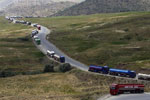 Reuters: Despite a pledge by Iraqi Kurdistan to crack down on the flow of fuel being smuggled to Iran, the only real impediment truck drivers say they face are long lines that force them to wait for days to cross.
Reuters: Despite a pledge by Iraqi Kurdistan to crack down on the flow of fuel being smuggled to Iran, the only real impediment truck drivers say they face are long lines that force them to wait for days to cross.
By Ahmed Rasheed and Shamal Aqrawi
 HAJ UMRAN Iraq (Reuters) – Despite a pledge by Iraqi Kurdistan to crack down on the flow of fuel being smuggled to Iran, the only real impediment truck drivers say they face are long lines that force them to wait for days to cross.
HAJ UMRAN Iraq (Reuters) – Despite a pledge by Iraqi Kurdistan to crack down on the flow of fuel being smuggled to Iran, the only real impediment truck drivers say they face are long lines that force them to wait for days to cross.
Perhaps around 100 tanker trucks corralled into groups of 10 or a dozen by Kurdish police idled on the road to the border point of Haj Umran on Tuesday, waiting for their chance to pass over to unload fuel at Iranian ports or fuel depots.
“I’ve been waiting for two days to be able to pass over to Iran and take my 24 tonnes of fuel safely to Bandar Abbas port,” said Barzan Hussain, a driver who works for a Kurdish shipping company based in Arbil.
The cross-border trade in fuel is a challenge to U.S. efforts to impose sanctions on Iran over its nuclear research programme, and an embarrassment for Washington’s Kurdish allies, eager to remain in the good books of the United States as U.S. troops prepare to withdraw from Iraq by the end of 2011.
It is also another thorn in the side of often tense relations between Iraq’s Arab majority and ethnic Kurds who have enjoyed virtual autonomy in their northern enclave since the end of the first Gulf War.
The Shi’ite-led federal government in Baghdad says any trade in crude oil would be illegal, because Iraqi law only allows the State Oil Marketing Organisation to export it.
It is also critical of any trade in refined products, because seven years after the U.S.-led invasion, Iraq still does not produce as much refined fuels as it needs and has to import.
On Monday, the cabinet of the Kurdish Regional Government approved stricter measures including stepped up border surveillance to stop any illegal trade in crude across its borders. There was little sign the next day at Haj Umran that border guards had been told to be more vigilant.
DANGEROUS, WINDING ROADS
The trucks heading to Iran brave dangerous, winding roads in some of the most mountainous parts of Iraq to reach Haj Umran, which lies in the shadow of Halgurd mountain, the highest peak in the country.
Drivers waiting at the border said companies they work for are only transporting fuel oil, like diesel and other refined products, to Iran and they make $80 (52 pound) per tonne, plus a bonus of $100 for each driver.
The mayor of Haj Umran town said all the fuel trucks going to Iran were working legally and for the regional government.
“Why would we stop them? These companies have legal contracts with the government of Kurdistan to transport fuel oil and oil waste to Iran,” mayor Karwan Aref told Reuters.
Aref said local officials had not received any instructions from the regional authorities to check the trade.
Shipping agents working with a company in Arbil said they signed contracts with the Kurdish region’s Minerals and Natural Resources Ministry about a year ago to transport all kinds of fuel to Iran in trucks. They declined to say whether crude oil was included.
The head of the Haj Umran border post, Hamad Jafaar, said only refined products were allowed to cross the border.
“All refined products transported to Iran are legal and carried out with the legal approval of the Minerals and Natural Resources Ministry and this is why we let them cross,” Jafaar told Reuters in his office.
Jafaar said he had not received any instructions to stop fuel shipments to Iran and had only heard of such measures on television.
Drivers waiting for their turn to cross to Iran said they usually unload the fuel at Bandar Imam or Bandar Abbas ports in Iran, where it is often re-exported, and sometimes travel to Afghanistan to deliver fuel.
“I transported two shipments to Afghanistan. We go through Iran and deliver our shipments to Afghan drivers, but I decided to stop because security is not good,” said truck driver Abul Razzaq Fatah.
Drivers said they load the fuel at refineries in the Kurdish region and are given documents in which quantities, fuel type and destination of cargos are established by Kurdish government officials in the refineries.
“They load my truck and hand me the documents. They say it is fuel oil and that’s all I know about my cargo and I don’t care,” said Majid Sultan, a truck driver from Anbar province.
Some are angry about criticism of the trade.
“Why all this fuss about Kurdish oil? Saddam’s regime was smuggling oil and buying weapons to use against the Iraqi people and nobody said a word. At least Kurds are selling their oil to Iran to rebuild our cities,” Fatah said. Regional lawmaker Nasiq Tawfiq, secretary of the energy committee of the Kurdish parliament, said the panel felt uncomfortable about the exports because the government had not explained where the revenues were going.
“All these sales to Iran should stop. The fuel sales are not transparent and are shrouded in secrecy. Unless all the information about the revenues is made public, it reeks of corruption,” Tawfiq told Reuters.
(Editing by Michael Christie and Angus MacSwan)


